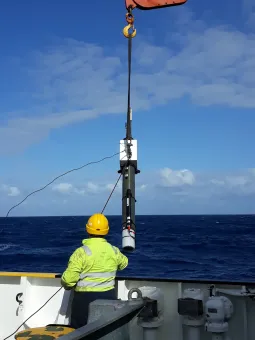
The National Oceanography Centre (NOC) has successfully deployed the first of the UK’s new fleet of Biogeochemical (BGC) Argo profiling floats as part of the international Argo programme.
The fleet of 15 robotic floats makes up 50% of the UK’s contribution to BGC Argo and is a vital source of ocean data, transforming the understanding of oceanic processes at depths up to 2,000m.
The deployment formed part of the NOC’s DY146 RAPID expedition to the Atlantic, where scientists from the NOC are servicing a collection of moorings that are helping to measure ocean currents and examine the effects on short-term weather and long-term climate. The floats – which saw an investment from the Natural Environment Research Council (NERC) and NOC of £3.7 million last year – have successfully performed several 24-hour cycles from the surface to depths of 2,000m, marking a huge step towards the UK’s enhanced ocean observations capability.
In comparison to previous robotic floats, the new BGC Argo fleet have new sensors that will measure pressure, temperature, salt content, pH (ocean acidity), oxygen, nitrate (a nutrient), chlorophyll, particles suspended in the water and light levels. Data from the Argo float are made freely available in near real-time to allow scientists across the world to address fundamental questions about the role of the ocean in absorbing human carbon emissions and the processes responsible for decreasing levels of oxygen in the global ocean.

Nathan Briggs, Ocean Biochemist at the National Oceanography Centre, said: “The ocean has absorbed more than 90% of the additional heat trapped by greenhouse gases, and a quarter of the anthropogenic carbon emissions. Argo floats have been taking the temperature of the top 2km of the ocean for the past 20 years, forming the beating heart of our system of ocean observations and revolutionising the information we have to guide climate solutions for society. This new generation of BGC-Argo floats with their additional sensors will provide a step change in our understanding of how the ocean’s changing biology, chemistry and physics interact to drive the ocean carbon cycle, including the exchange of carbon between the atmosphere and the ocean.”
Dr Giorgio Dall’Olmo, Merit Scientist at Plymouth Marine Laboratory and lead scientist for the UK BGC-Argo programme, added: “These new BGC-Argo floats are the first deployed by the UK that can measure all six BGC-Argo variables. This is a crucial step towards building the planned BGC-Argo array of 1,000 six-variable BGC-Argo floats that, together with 2,500 core-Argo floats and 1,000 deep-Argo floats (measuring temperature and salinity down to 6,000m), will take the pulse of the global ocean. If we want to continue reaping the benefits afforded by these unique data, we now need to continue building the new Argo array and then ensure that it is sustained in the future.”
Following the successful trial, the new fleet will now be deployed at various locations across the Atlantic Ocean, drifting freely to collect observations between the surface and a depth of 2,000m and operating continuously for approximately five years. The next fleet, which will see an investment of an additional 15 Argo profiling floats, will complete the UK Atlantic Sector Biogeochemical Argo Network (ASBAN-UK), paving the way for researchers gaining new insights into how the ocean and climate are changing, improving forecasts for planning, resource management, policy development and restoring the health of the ocean.